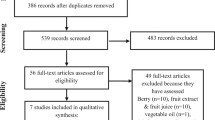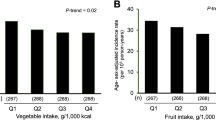Abstract
Objectives
No quantitative assessment has been performed to specifically link the consumption of fruit and vegetables with the incident risk of cognitive disorders.
Methods
We searched the PubMed and the Embase databases (both from the inception to June 13th, 2016) for records that report the intake of fruit and vegetables and the risk of developing cognitive disorders (Alzheimer’s disease, dementia, and cognitive decline/ impairment). A generic inverse-variance method (random-effects model) was used to combine the relative risks (RRs) and 95% confidence intervals (CIs). To explore the potential sources of heterogeneity, we performed the subgroup and meta-regression analyses by pre-specified characteristics.
Results
We identified 6 cohorts involving a total of 21,175 participants. The pooled analysis showed that consumption of fruit and vegetables was inversely associated with the incident risk of cognitive disorders, and the pooled RR (95% CI) was 0.74 (0.62, 0.88), with evidence of significant heterogeneity (I2 =68%). Furthermore, we found that the significant heterogeneity might be attributed to the ethnic difference.
Conclusion
Further large prospective studies should be performed to quantify the potential dose-response patterns of fruit and/or vegetables intake and to explore the role of fruit or vegetables consumption separately on cognitive disorders in different populations.




Similar content being viewed by others
Abbreviations
- AD:
-
Alzheimer’s Disease
- FFQ:
-
food-frequency questionnaire
- DSM:
-
Diagnostic and Statistical Manual of Mental Disorders
- NINCDS-ADRDA:
-
National Institute of Neurological and Communicative Disorders and Stroke-Alzheimer’s Disease and Related Disorders Association
- FAQ:
-
Functional Activities Questionnaire
- DECO:
-
Observed Cognitive Deterioration
- NOS:
-
Newcastle-Ottawa Scale
- RR:
-
relative risk
- HR:
-
hazard ratio
- OR:
-
odds ratios
- 95% CI:
-
95% confidence interval
References
Alzheimer’s Association. 2013 Alzheimer’s disease facts and figures. Alzheimers Dement 2013;9:208–245.
Brookmeyer R, Gray S, Kawas C. Projections of Alzheimer’s disease in the United States and the public health impact of delaying disease onset. Am J Public Health 1998;88:1337–1342.
Wu L, Sun D, He Y. Coffee intake and the incident risk of cognitive disorders: A dose-response meta-analysis of nine prospective cohort studies. Clin Nutr 2016 May 30. doi: 10.1016/j.clnu.2016.05.015. (Epub ahead of print)
Matthews FE, Arthur A, Barnes LE, Bond J, Jagger C, Robinson L, Brayne C; Medical Research Council Cognitive Function and Ageing Collaboration: A twodecade comparison of prevalence of dementia in individuals aged 65 years and older from three geographical areas of England: results of the Cognitive Function and Ageing Study I and II. Lancet 2013;382:1405–1412.
Niu J, Han H, Wang Y, Wang L, Gao X, Liao S. Sleep quality and cognitive decline in a community of older adults in Daqing City, China. Sleep Med 2016;17:69–74.
Virta JJ, Heikkilä K, Perola M, Koskenvuo M, Räihä I, Rinne JO, Kaprio J. Midlife sleep characteristics associated with late life cognitive function. Sleep 2013;36:1533–1541,1541A.
Reas ET, Laughlin GA, Kritz-Silverstein D, Barrett-Connor E, Mc Evoy LK. Moderate, regular alcohol consumption is associated with higher cognitive function in older community-dwelling adults. J Prev Alzheimers Dis 2016;3:105–113.
Zhang Y, Chen J, Qiu J, Li Y, Wang J, Jiao J. Intakes of fish and polyunsaturated fatty acids and mild-to-severe cognitive impairment risks: a dose-response metaanalysis of 21 cohort studies. Am J Clin Nutr 2016;103:330–340.
Annweiler C, Milea D, Whitson HE, Cheng CY, Wong TY, Ikram MK, Lamoureux EL, Sabanayagam C. Vitamin D insufficiency and cognitive impairment in Asians: a multi-ethnic population-based study and meta-analysis. J Intern Med 2016;280:300–311.
World Health Organization. Report of a WHO Study Group. Diet, nutrition, and the prevention of chronic diseases. WHO, editor. Geneva, Switzerland 1990.
Wu L, Sun D, He Y. Fruit and vegetables consumption and incident hypertension: dose-response meta-analysis of prospective cohort studies. J Hum Hypertens 2016;30:573–580.
Zhan J, Liu YJ, Cai LB, Xu FR, Xie T, He QQ. Fruit and Vegetable Consumption and Risk of Cardiovascular Disease: a Meta-analysis of Prospective Cohort Studies. Crit Rev Food Sci Nutr 2015 Jun 26:0. (Epub ahead of print)
Wang X, Ouyang Y, Liu J, Zhu M, Zhao G, Bao W, Hu FB. Fruit and vegetable consumption and mortality from all causes, cardiovascular disease, and cancer: systematic review and dose-response meta-analysis of prospective cohort studies. BMJ 2014;349:g4490.
Wu Y, Zhang D, Jiang X, Jiang W. Fruit and vegetable consumption and risk of type 2 diabetes mellitus: A dose-response meta-analysis of prospective cohort studies. Nutr Metab Cardiovasc Dis 2015;25:140–147.
Gan Y, Tong X, Li L, Cao S, Yin X, Gao C, Herath C, Li W, Jin Z, Chen Y, Lu Z. Consumption of fruit and vegetable and risk of coronary heart disease: A metaanalysis of prospective cohort studies. Int J Cardiol 2015;183:129–137.
Larsson SC, Virtamo J, Wolk A. Total and specific fruit and vegetable consumption and risk of stroke: a prospective study. Atherosclerosis 2013;227:147–152.
Gadgil MD, Anderson CA, Kandula NR, Kanaya AM. Dietary patterns are associated with metabolic risk factors in South Asians living in the United States. J Nutr 2015;145:1211–1217.
Loef M, Walach H. Fruit, vegetables and prevention of cognitive decline or dementia: a systematic review of cohort studies. J Nutr Health Aging 2012;16:626–630.
Lamport DJ, Saunders C, Butler LT, Spencer JP. Fruits, vegetables, 100% juices, and cognitive function. Nutr Rev 2014;72:774–789.
Cao L, Tan L, Wang HF, Jiang T, Zhu XC, Lu H, Tan MS, Yu JT. Dietary patterns and risk of dementia: a systematic review and meta-analysis of cohort studies. Mol Neurobiol 2015 Nov 9. (Epub ahead of print)
Barberger-Gateau P, Raffaitin C, Letenneur L, Berr C, Tzourio C, Dartigues JF, Alpérovitch A. Dietary patterns and risk of dementia: the Three-City cohort study. Neurology 2007;69:1921–1930.
Dai Q, Borenstein AR, Wu Y, Jackson JC, Larson EB. Fruit and vegetable juices and Alzheimer’s disease: the Kame Project. Am J Med 2006;119:751–759.
Hughes TF, Andel R, Small BJ, Borenstein AR, Mortimer JA, Wolk A, Johansson B, Fratiglioni L, Pedersen NL, Gatz M. Midlife fruit and vegetable consumption and risk of dementia in later life in Swedish twins. Am J Geriatr Psychiatry 2010;18:413–420.
Ritchie K, Carrière I, Ritchie CW, Berr C, Artero S, Ancelin ML. Designing prevention programmes to reduce incidence of dementia: prospective cohort study of modifiable risk factors. BMJ 2010;341:c3885.
Roberts RO, Geda YE, Cerhan JR, Knopman DS, Cha RH, Christianson TJ, Pankratz VS, Ivnik RJ, Boeve BF, O’Connor HM, Petersen RC. Vegetables, unsaturated fats, moderate alcohol intake, and mild cognitive impairment. Dement Geriatr Cogn Disord 2010;29:413–423.
Vercambre MN, Boutron-Ruault MC, Ritchie K, Clavel-Chapelon F, Berr C. Longterm association of food and nutrient intakes with cognitive and functional decline: a 13-year follow-up study of elderly French women. Br J Nutr. 2009;102:419–427.
Higgins JPT, Green S, eds; Cochrane Handbook for Systematic Reviews of Interventions, Version 5.1.0 (updated March 2011). The Cochrane Collaboration. Available: http://www.cochrane-handbook.org.
Stroup DF, Berlin JA, Morton SC, Olkin I, Williamson GD, Rennie D, Moher D, Becker BJ, Sipe TA, Thacker SB. Meta-analysis of observational studies in epidemiology: a proposal for reporting. Meta-analysis Of Observational Studies in Epidemiology (MOOSE) group. JAMA 2000;283:2008–2012.
Wells GA, Shea B, O’Connell D, Peterson J, Welch V, Losos M. The Newcastle-Ottawa Scale (NOS) for assessing the quality of nonrandomized studies in metaanalyses 2011; Available from: http://www.ohri.ca/programs/clinical_epidemiology/ oxford.asp.
Begg CB, Mazumdar M. Operating characteristics of a rank correlation test for publication bias. Biometrics 1994;50:1088–1101.
Egger M, Davey Smith G, Schneider M, Minder C. Biasin meta-analysis detected by a simple, graphical test. BMJ 1997;315:629–634.
Hu D, Huang J, Wang Y, Zhang D, Qu Y. Fruits and vegetables consumption and risk of stroke: a meta-analysis of prospective cohort studies. Stroke 2014;45:1613–1619.
Kang JH, Ascherio A, Grodstein F. Fruit and vegetable consumption and cognitive decline in aging women. Ann Neurol 2005;57:713–720.
Morris MC, Evans DA, Tangney CC, Bienias JL, Wilson RS. Associations of vegetable and fruit consumption with age-related cognitive change. Neurology 2006;67:1370–1376.
Engelhart MJ, Geerlings MI, Ruitenberg A, van Swieten JC, Hofman A, Witteman JC, Breteler MM. Dietary intake of antioxidants and risk of Alzheimer disease. JAMA 2002;287:3223–3229.
Itoh Y, Hine K, Miura H, Uetake T, Nakano M, Takemura N, Sakatani K. Effect of the Antioxidant Supplement Pyrroloquinoline Quinone Disodium Salt (BioPQQ™) on Cognitive Functions. Adv Exp Med Biol 2016;876:319–325.
Soni M, Rahardjo TB, Soekardi R, Sulistyowati Y, Lestariningsih, Yesufu-Udechuku A, Irsan A, Hogervorst E. Phytoestrogens and cognitive function: a review. Maturitas 2014;77:209–220.
Panickar KS, Jang S. Dietary and plant polyphenols exert neuroprotective effects and improve cognitivefunction in cerebral ischemia. Recent Pat Food Nutr Agric 2013;5:128–143.
Patil CS, Singh VP, Satyanarayan PS, Jain NK, Singh A, Kulkarni SK. Protective effect of flavonoids against aging-and lipopolysaccharide-induced cognitive impairment in mice. Pharmacology 2003;69(2):59–67.
Rogers EJ, Milhalik S, Orthiz D, Shea TB. Apple juice prevents oxidative stress and impaired cognitive performance caused by genetic and dietary deficiencies in mice. J Nutr Health Aging 2004;8:92–97.
Najimi A, Ghaffari M. Promoting fruit and vegetable consumption among students: a randomized controlled trial based on social cognitive theory. J Pak Med Assoc 2013;63:1235–1240.
Author information
Authors and Affiliations
Corresponding author
Rights and permissions
About this article
Cite this article
Wu, L., Sun, D. & Tan, Y. Intake of fruit and vegetables and the incident risk of cognitive disorders: A systematic review and meta-analysis of cohort studies. J Nutr Health Aging 21, 1284–1290 (2017). https://doi.org/10.1007/s12603-017-0875-6
Received:
Accepted:
Published:
Issue Date:
DOI: https://doi.org/10.1007/s12603-017-0875-6




